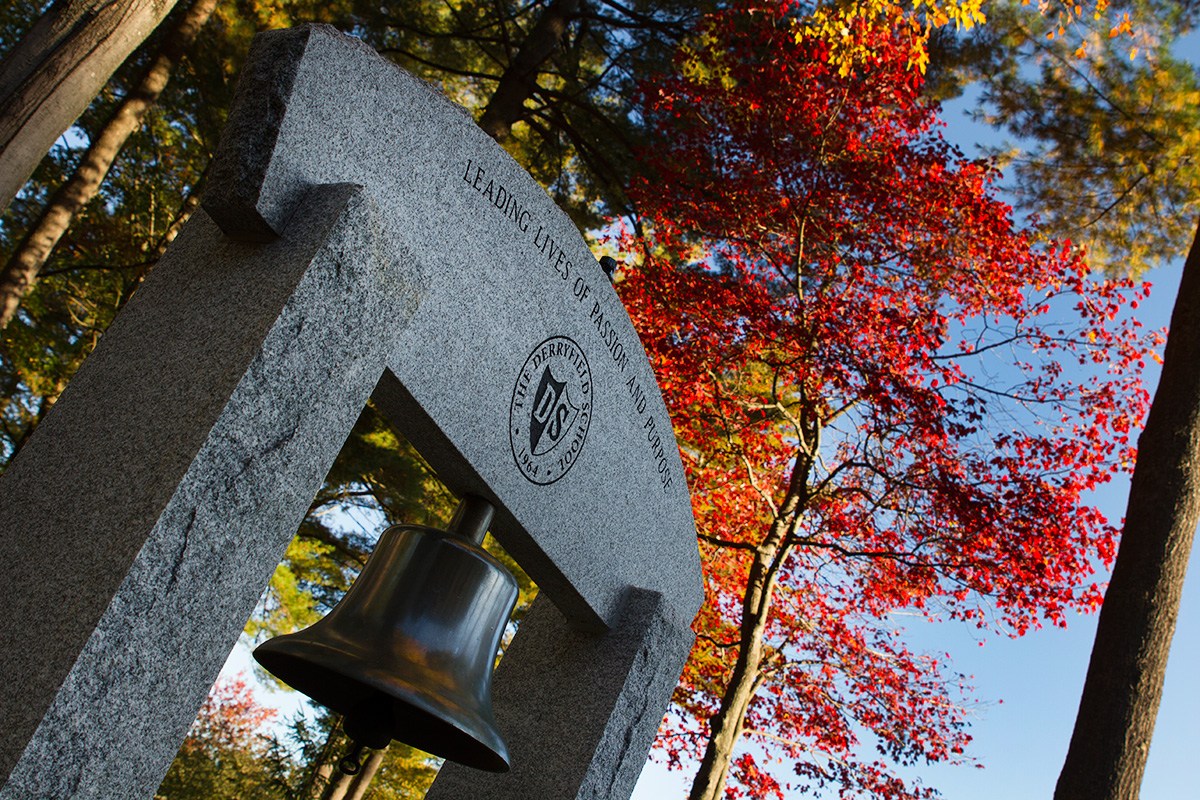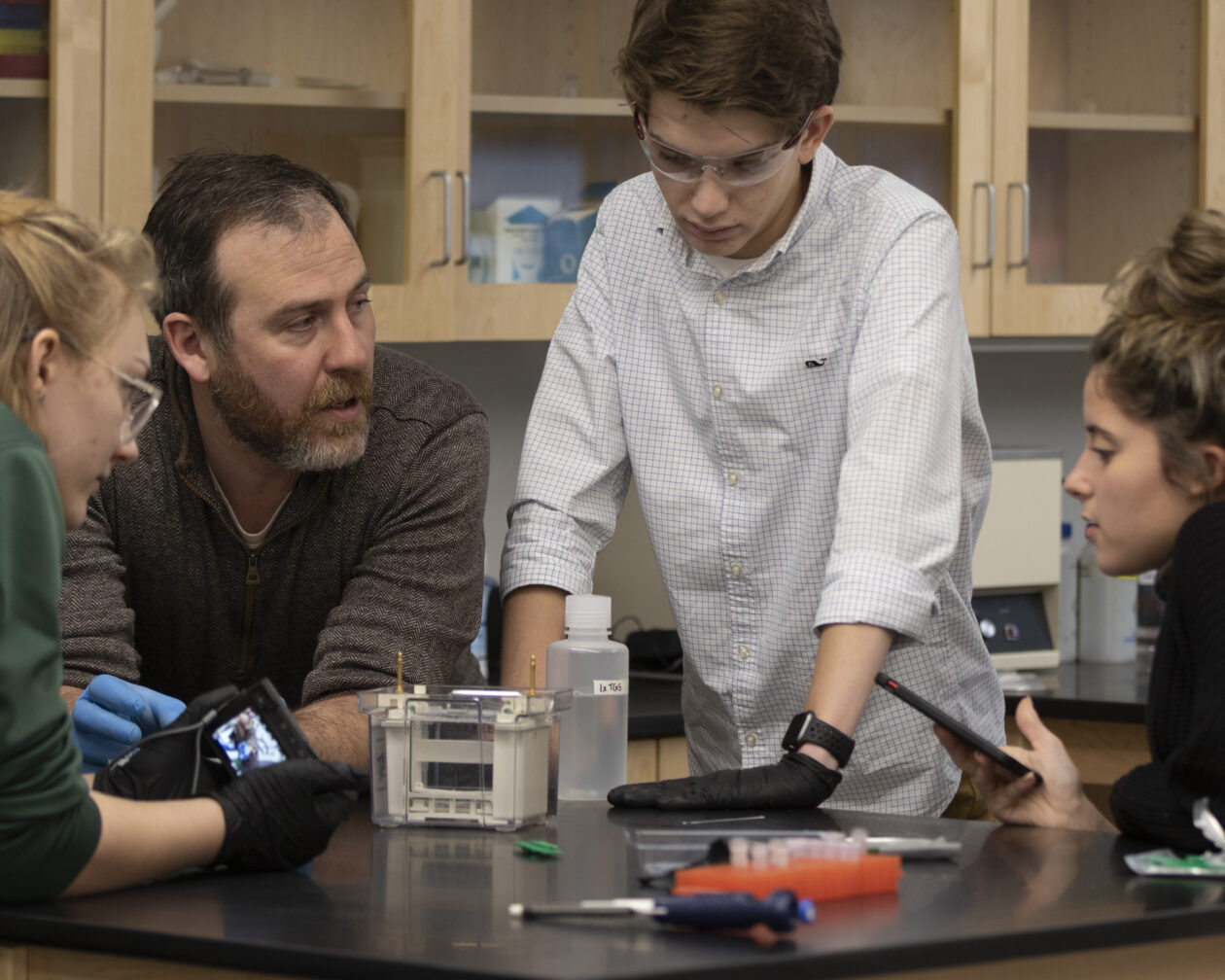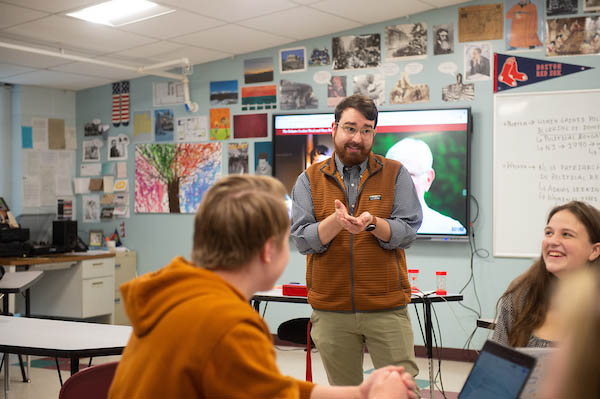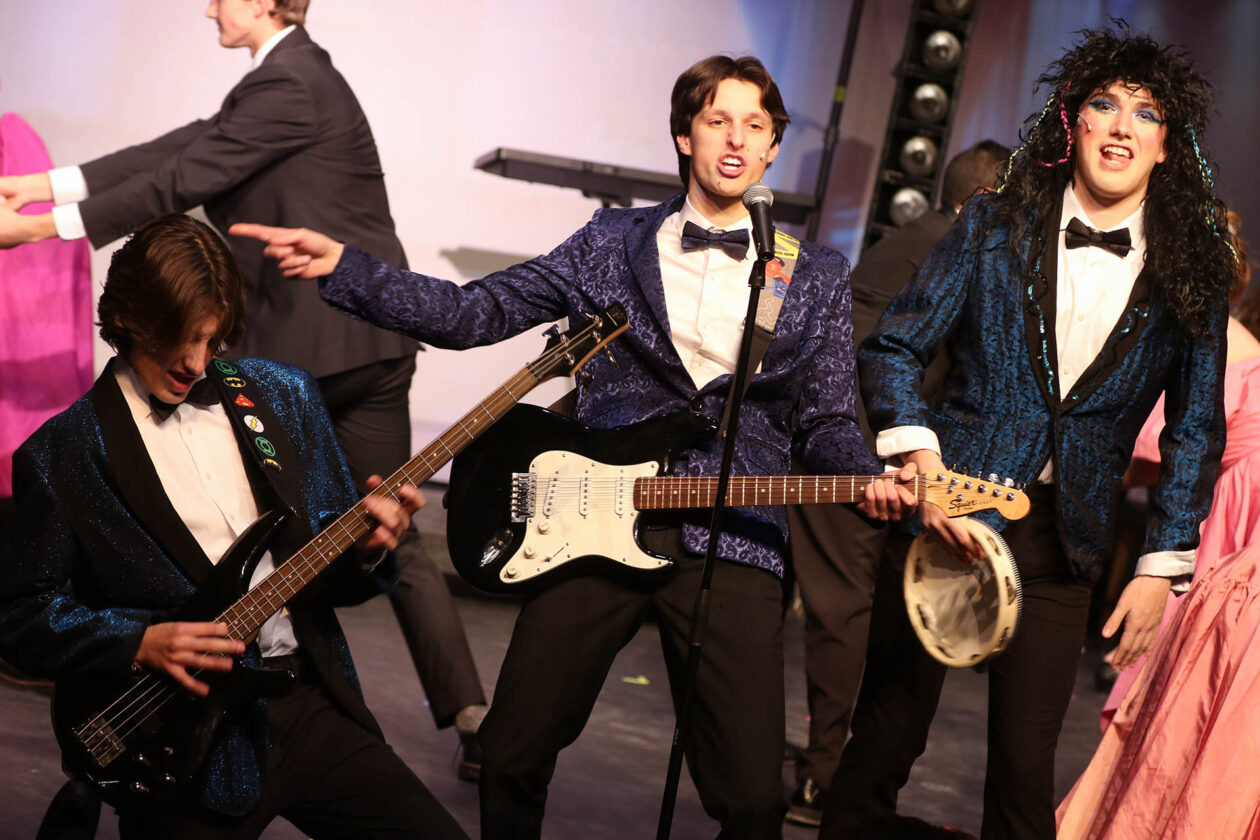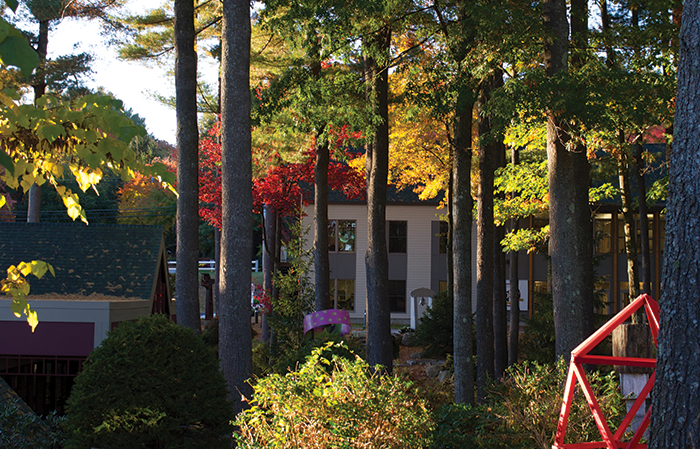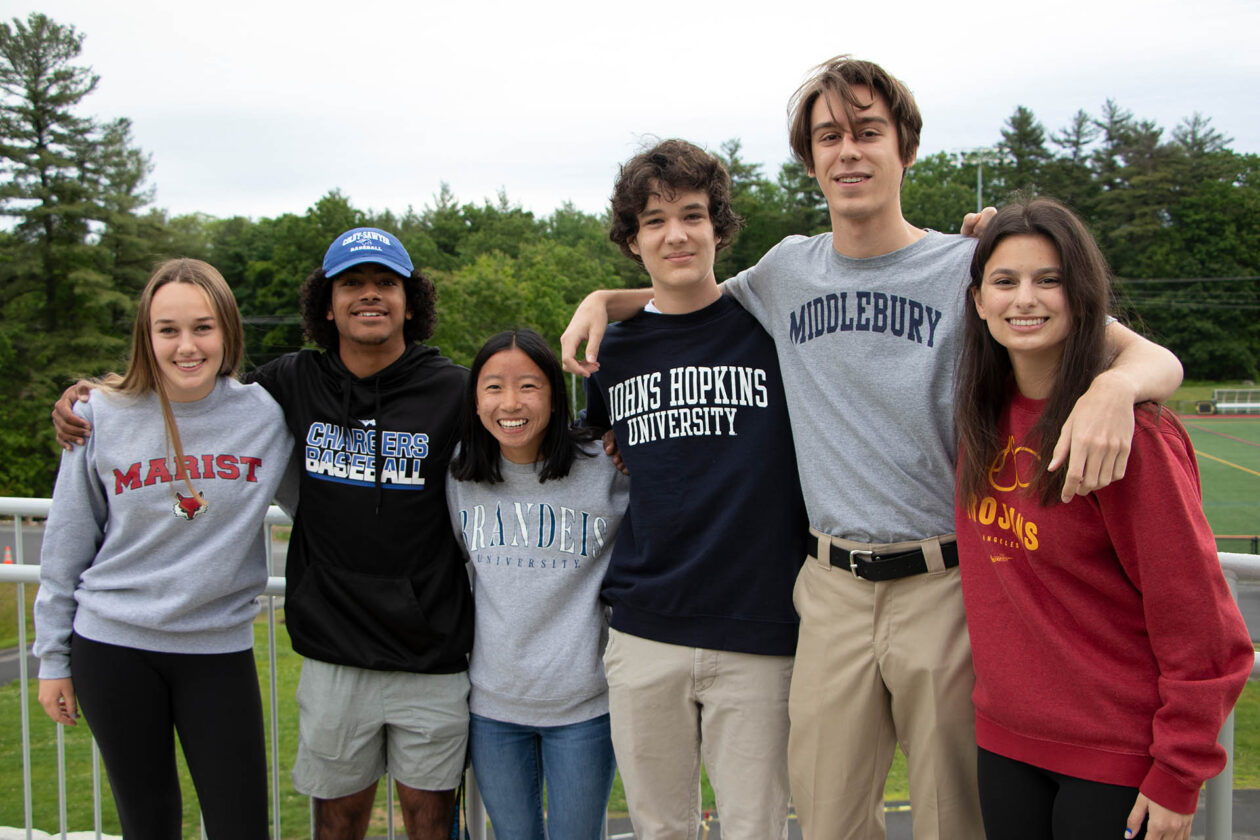Upper School English
The Philosophy
In our English classes, we cultivate students’ creativity, empathy and personal and intellectual growth through extensive reading, writing, listening, and speaking. At the same time, we strive to develop students’ appreciation of and skill with the English language. All of this begins with the close examination of literature—the artful expressions of our language which touch on the universal questions of the human condition. In a natural circle, this study of literature helps students’ writing, while their writing deepens their appreciation of literature and life. We promote personal growth through deep thinking about moral and ethical questions raised in reading and explored in discussion and writing. We pursue a way of critical thinking more than a set of moral answers, pushing students to develop their own independent beliefs. Similarly, we pursue students’ individual writing processes, rather than strict writing formulas, preparing them to formulate creative questions and conceptual frameworks as they approach increasingly challenging material.
To promote further independence, we provide students with a variety of teaching styles and writing expectations, balancing this with common goals for our work with the language and literature. To encourage wider perspectives, we study diverse texts from various cultures and eras. In sum, we hope to instill a love of words and books and effective expression, and the depth of thinking and feeling that one experiences in this lifelong pursuit.
English 9: Change Agents
Open to: Grade 9
Daily reading, discussion, and writing to interpret texts are the heart of English 9. Through individual study, feedback, creativity, and collaboration, this course moves ninth graders into deeper levels of interpretive reading and writing. Students practice writing analytical paragraphs and essays, poetry, personal reflections and narratives, and short fiction. We challenge students to develop flexibility in their writing process and control over structure and mechanics through frequent analytical responses, multimedia projects and presentations. We emphasize active reading of challenging texts and require students to take responsive notes while reading. Our texts may include Being Heumann; Fahrenheit 451; True Grit; Henry IV Part 1; Born a Crime; The Poet X and House on Mango Street. Students will also study poems, read independently-chosen novels and short fiction, and view films. Through interacting with a diverse body of work, students will seek to understand what it means for individuals and ourselves to become change agents. In addition, students will begin to develop basic research skills that include identifying a problem, formulating research questions, conducting research analysis, and presenting findings to a public audience. Through individual reading and shared inquiry, we push students to make meaning of texts and the world around them. To help them in this process, students practice integrating SAT vocabulary into their working vocabularies and recognizing the grammatical underpinnings of their own powerful sentences.
English 9 Honors: Change Agents
Open to: Grade 9
The honors option is designed for students who possess an intellectual curiosity and a strong desire to engage in perspective-taking around a variety of high level discussions. Students should be excellent collaborators and fluent readers and writers with the ability to make inferences and contribute daily to class discussions. We will grapple with the same themes of becoming change agents. In addition, students may also read additional texts such as Antigone, The Crucible, True Grit, and short stories to complement larger units of study. This fast-paced class is an option for students who possess a passion to read and write and who are looking for the opportunity to discuss key course concepts in high level seminars. In addition, students will continue to build their vocabularies and expand their knowledge of grammar to create effective written work. Lastly, this course will culminate with a self-reflective project asking students to synthesize major themes from multiple sources and present their findings in a medium of their choosing.
English 10: The World’s Stories
Open to: Grade 10
Tenth grade English invites students to explore the richness and complexity of human experience and cultural interaction through global literature. With the goal of seeking differing perspectives and identifying common threads, students read texts such as Things Fall Apart, Persepolis, 1984, The Tempest, and a variety of international poetry and short stories. Students are encouraged to participate actively in a seminar classroom, and to develop their thinking, speaking, and writing skills in response to literature. The course concentrates on the writing process as students write analytical and creative pieces as well as personal narratives. Students do extensive work on revision and editing, supported by targeted weekly grammar and vocabulary study. Students will be asked to read closely, to develop meaningful interpretation through cultural and historical connections, comparisons between texts, and personal experience. A capstone project for tenth-grade English is the creation of the “This Sophomore Life” podcast: using individual personal essays as the building blocks, students work in teams to develop a thematically-linked audio narrative.
English 10 Honors: The World’s Stories
Open to: Grade 10
The honors option is designed for students who possess an intellectual curiosity and a strong desire to engage in perspective-taking around global views. Students should be excellent collaborators and fluent readers and writers with the ability to make inferences and contribute daily to seminar-style discussions. Through reading and studying world literature, students will grapple with the same themes of culture, independence, and connectedness, and reading selections will mirror some of the same texts that are read in English 10. In addition, students may also read Brave New World, The Handmaid’s Tale, Purple Hibiscus, and The White Tiger. This fast-paced class is an option for students who are passionate about reading and writing and who are looking for the opportunity to discuss key course concepts in high-level seminars. Writing assignments will include complex analytical essays asking students to explore themes and shared ideas across texts in addition to culminating projects around culture and identity. In addition, students will continue to build their vocabularies and expand their knowledge of grammar to create effective written work. Finally, the year will end with the capstone project for tenth grade English—the creation of the “This Sophomore Life” podcast: using individual personal essays as the building blocks, students work in teams to develop a thematically-linked audio narrative.
Advanced Topics English: Exploring Effective Civil Discourse in American Literature and Culture
Open to: Grade 11
In this course, students will explore critical moments in history when the country was polarized over issues such as race, gender and class, in order to define and explore what makes for effective civil discourse. Students will focus, among other topics, on the Civil War and the national conversation on race as well as the emergence of the New Woman and later waves of feminism as lenses into our national debate on freedom. Students will examine moments when an exchange of text, art, and/or action–such as a speech, a protest, a novel, a film, or other media– shifted our understanding, our actions, the law, or even the tide of the culture. Students will ask what is civil discourse and why are some media more effective in a given time than others? In addition to studying historical models, stories, and poems, students will also analyze current events and create their own modes of civil discourse, practicing effective communication that can inform, persuade, illuminate, entertain and transform. Writing in the course will emphasize fine tuning the art of rhetorical analysis, as well as practicing various narrative modes throughout the year. The year will conclude with a student-driven research paper and a final multimedia project.
Literature may include In Our Own Words: Extraordinary Speeches of the American Century (Torricelli, Carroll); The Narrative of the Life of Frederick Douglass (Douglass); The Awakening (Chopin); The Underground Railroad (Whitehead); The Great Gatsby (Fitzgerald); A Room of One’s Own (Woolf); Just Mercy (Stevenson); Dissent: The History of an American Idea (Young); poetry and contemporary short stories.
American Literature and Composition
Embedded Honors Option Available
Open to: Grade 11
What does it mean to be American and to represent America? What are the social and cultural forces that shape American identity? In this course, students investigate through critical reading of, engagement with, and discussion of a variety of texts the ways in which American identity and American culture have been expressed, represented, and evolved since the birth of the republic to the present day. We will consider if and how these texts delineate an idea of a “traditional” or normative American, and then how subsequent texts respond to and challenge this idea of a “traditional American.” Through the representations of a diverse array of American identities in an assortment of texts that progress historically from short fiction and non-fiction essays of the early republic to 19th-century thinkers (Emerson, Douglass, Hawthorne, Thoreau), Fitzgerald’s The Great Gatsby, and eventually post-modern and contemporary texts, students will investigate how an array of social forces have influenced the way these authors and artists have represented America and Americans. Together we will question if the very idea of America and American culture creates a counter-traditional American to the normative, often dominant culture initially expressed by texts from the early republic.
Alongside our exploration of the cornerstone texts that have represented America, students will explore and develop their own representation of America through a series of writings. Through studying several different modes of writing, including personal narration, argumentation, analysis, memoir, creative nonfiction, and digital storytelling, students will then have the opportunity to experiment with these forms, writing to discover their writing process, their ideas about American cultural identity, and their own distinct voice. By year’s end, students will have built the skills, confidence, and independence to read and write critically, while also continuing to develop a mastery of vocabulary, grammar, an economy of style, and their own unique writing voices through frequent drafting, deep revision, and careful editing of their vocabulary. The embedded honors options focuses more deeply on the course essential questions and requires students to read additional texts, write additional analytical responses, lead class lessons, and participate in additional seminar discussions.
Advanced Topics English: Literature through Critical Lenses
Open to: Grade 12
Literature through Critical Lenses invites students to take a deep dive into the exploration of literature, ranging from the ancient Greek tragedy to the twenty-first century. This course will offer students the opportunity to spend the year reading novels, plays, poems, and short stories from a broad range of authors, genres, and cultural settings. Potential texts may include Medea, King Lear, A Doll House, Jane Eyre, Beloved, Mrs. Dalloway, Angels in America, White Teeth, Long Live the Tribe of Fatherless Girls, and All the Pretty Horses. Each term, students will explore thematic ideas along with the zeitgeist of an age. Through additional readings in philosophy and psychology, students will develop familiarity with theoretical terms and concepts and employ them to understand the tension reflected in the works studied. Students will examine how a diverse array of thinkers have attempted to answer questions around gender, race, family, loyalty, and ultimately, the self, and we will consider how the specifics of geography, politics, ethnicity, language, gender, economics, and other factors combine to create compelling stories.
The essential questions that will guide the scope of the course are: How does literary form create meaning? How are the social and historical values of a time period reflected in a work? How can students create a personal writing style through effective use of rhetoric? And what diverse ideas exist around texts with regard to literary criticism? This course will emphasize sophisticated analytical writing and speaking skills, and students will focus on understanding and presenting on authorial craft and technique. Guided by our coursework and following their own intellectual pull, students will engage in a year-long project investigating a writer or thematic concept; students will take a deep dive into this exploratory element, eventually creating a digital anthology including art, music, their own critical writing, and scholarly work.
Humanities Seminar Fall: Finding Truth
Embedded Honors Option Available
Open to: Grades 11 & 12
The fall term in Humanities Seminar seeks to answer the following question: How can we determine what is true or right in our lives? How do differences in understandings of truth influence the way people act? Using the philosophies of Plato, Nietzsche, Kant, Zhuang Zhou and others, we will analyze art and literature to explore the views of people in different times and come to a deeper understanding of the development in understanding of these concepts. We will begin by studying the cosmologies of ancient people and how they find truth in a world they do not fully understand and chart the development in understanding through the subsequent ages. Students will use their understanding to analyze the art, literature and practices of different cultures to understand how they reflect ideas of truth in the purposeful life. This seminar-style class will rely heavily on analysis in both projects and class discussion. Humanities Seminar is an interdisciplinary course that considers the intersection of history, literature, the arts and culture. Students may enroll for a single term in the fall or winter terms. The fall or winter term is a prerequisite for the spring term. This course can be taken either as a History or English credit. Generally, this course is offered as a second History or English course to Juniors.
Humanities Seminar Winter: Ethics of Power
Embedded Honors Option Available
Open to: Grades 11 & 12
In every sphere of life, there are those who are in positions of power over others. The winter term in Humanities Seminar will explore the ethical and philosophical theories behind power dynamics and seek to understand how to define and practice ethical leadership. We will begin our study in the Age of Enlightenment with the idea of the “social contract” and delve into the ideas of moral theory and ethics as they relate to power dynamics within the family, the government and interpersonal relationships. Using the philosophies of thinkers such as Locke, Mill, Machiavelli, Confucius, Wollstonecraft and others, students will analyze literature and art of different cultures to explore the basis and justification for historical power structures. The course will culminate in a project in which students attempt to determine what ethical practice of power looks like by using an example of their choosing. This seminar-style class will rely heavily on analysis in both projects and class discussions. Humanities Seminar is an interdisciplinary course that considers the intersection of history, literature, the arts and culture. Students may enroll for a single term in the fall or winter terms. The fall or winter term is a prerequisite for the spring term. This course can be taken either as a History or English credit. Generally, this course is offered as a second History or English course to Juniors.
Humanities Seminar Spring: Ancient Moderns, Modern Ancients
Embedded Honors Option Available
Open to: Grades 11 & 12
Prerequisite: Either Humanities Seminar Fall or Humanities Seminar Winter
The spring term in this course will serve as a culmination of the topics covered in the fall and/or winter term. Students will be engaging in a project experience in which they examine modern literature, art or film and connect it to ideas presented earlier in the year. The focus for students will be to map the progression of ideas from ancient or renaissance sources in order to explain their relevance to and impact on the modern world. Final products will be displayed in a public forum where students will engage with their peers about their experience. Humanities Seminar is an interdisciplinary course that considers the intersection of history, literature, the arts and culture. Students may enroll for a single term in the fall or winter terms. The fall or winter term is a prerequisite for the spring term. This course can be taken either as a History or English credit.
Senior English Fall: The Concept Album as Literature
Open to: Grades 11 & 12
Are you ready to dissect some of music’s most profound works? In this elective, students will spend the first half of the trimester collectively examining an influential concept album by artists such as Marvin Gaye, Pink Floyd, or Beyonce in order to understand how musicians use composition, lyrics, sound, and language to create an album around a central theme or idea. During the second half of the trimester, students will learn the necessary skills to create their own serial podcast that examines an iconic concept album of their choice. For this project, students will deconstruct lyrics and instrumentation, and apply literary elements to a culturally relevant album. Writings will include music reviews, analytical pieces, podcast scripts, and comparison essays while readings will consist of articles on music theory, music criticism, and reviews. Students will come away with an understanding of the narrative, thematic, and resistance concept album and will learn to culturally and historically contextualize their album and “read” it as one would read a book.
Senior English Winter: Don’t Judge a Book by its Movie
Open to: Grades 11 & 12
The author Stephen King said, “Books and movies are like apples and oranges. They are both fruits but taste completely different.” In this trimester-long course, students will investigate the relationship between literature and film in an attempt to answer the following questions: What can film achieve that a novel or play cannot, and vice versa? What is lost in the translation of literature into film, and what makes a “good” adaptation? In the first half of the trimester, students will read and critically examine a class text to explore not only its literary elements, but also its cultural relevance and context. Possible texts could include Frankenstein, Jaws, or The Color Purple. Once complete, students will watch the film adaptation and critically examine and compare the strategies used to visually adapt the story to the screen to determine which form is most successful at telling the story, the written or the visual one. During the second half of the trimester, students will have the opportunity to choose a piece of literature to read and analyze and watch its visual interpretation to determine which form most successfully tells the story. Students will explore the art of review writing, both book and film, as well as gain practice analyzing literary and cinematic elements of storytelling.
Senior English Spring: Creative Writing
Open to: Grades 11 & 12
This exciting and ambitious course will examine the craft and technique of creative writing. Students will have the opportunity to explore fiction and poetry. Through in-class exercises, journaling, and longer pieces, students will work to find and hone their own unique voices. They will heighten their imaginative sense of seeing, structure, and narrative movement. Readings of both traditional and modern authors will supplement discussions of form and technique, and students will participate in several workshops throughout the term. The course will conclude with a final self-designed project of substantial length.
Public Speaking
Fall, Winter, Spring
Open to: Grades 9-12
At some point or another, we are all called upon to speak in public, be it a commencement speech, speaking at an assembly, a business presentation, or a toast at a wedding. This course is designed to help those students seeking to improve their skill at speaking before a live audience by focusing on the techniques of voice and body control (breathing, intonation, volume, articulation, gesture, posture) that will give them the self confidence to deliver a successful speech. Students will learn the various forms of public speaking: informative, demonstrative, persuasive, and extemporaneous speeches, as well as learning the necessary skills for one-on-one and team debating. They will examine famous historical speeches and TED talks to decipher what makes a speech successful. Students will experience writing original speeches and presenting them in a public forum. This course fulfills one third of the Creative Arts departmental requirement. This course may be applied to English departmental graduation requirements in grade 12.
The Composition of Film
Fall, Winter, Spring
Open to: Grades 9-12
Open to: Grades 9-12 Storytelling has been the lifeblood of civilization. The rules for telling those stories, however, changed forever with the advent of moving pictures. Students will look at the advancement in American filmmaking by viewing, analyzing, and critiquing some of the most important films that changed the techniques of how movies are made from such esteemed directors as Charlie Chaplin, Orson Welles, John Ford, Alfred Hitchcock and Martin Scorsese to the present day directors such as Kathryn Bigelow, Greta Gerwig, Spike Lee, and Jordan Peele. They will analyze how film narratives have changed as people of color and women have become major voices in Hollywood. This course fulfills one third of the Creative Arts departmental requirement. This course may be applied to English departmental graduation requirements in grade 12.
American Comedy: A History in Film, Radio and Television
Spring
Open to: Grades 9-12
Ever wonder why The Office makes you laugh? Will it still be funny to you in twenty years? Is comedy universal or is it generational? Are the Marx Brothers still funny? Would Stephen Colbert make people laugh in the 1950s? In this course, we will examine and analyze the progression of comedy in American entertainment for the last 100 years from vaudeville to Tik Tok. Students will explore in detail how and why certain comedy was considered funny to their audiences by putting them into their historical contexts. We will examine the politically and socially groundbreaking work of Lenny Bruce, Mort Sahl, George Carlin, and Richard Pryor and how comedy challenged censorship and our First Amendment rights, going all the way to the Supreme Court. At the end of the term, students will be able to clearly understand the role comedy has played in shaping American culture. This course fulfills one third of the Creative Arts departmental requirement. This course may be applied to English departmental graduation requirements in grade 12.
War in Film
Winter
Open To: Grades 9-12
Open to: Grades 9-12 How is war depicted in movies? Is it glamorized, criticized, or satirized? When are movies used as propaganda and when are they used as a tool for soul searching. Do the films influence the decision makers in Washington D.C.? Each generation tackles these and many other pertinent questions of what it means for their country to go to war. In the course “War in Film”, students will study Hollywood’s depiction of war by viewing essential and groundbreaking films from Hollywood’s greatest directors including Stanley Kubrick, Steven Spielberg, Francis Ford Coppola, and Kathryn Bigelow. This course fulfills one third of the Creative Arts departmental requirement. This course may be applied to English departmental graduation requirements in grade 12.
